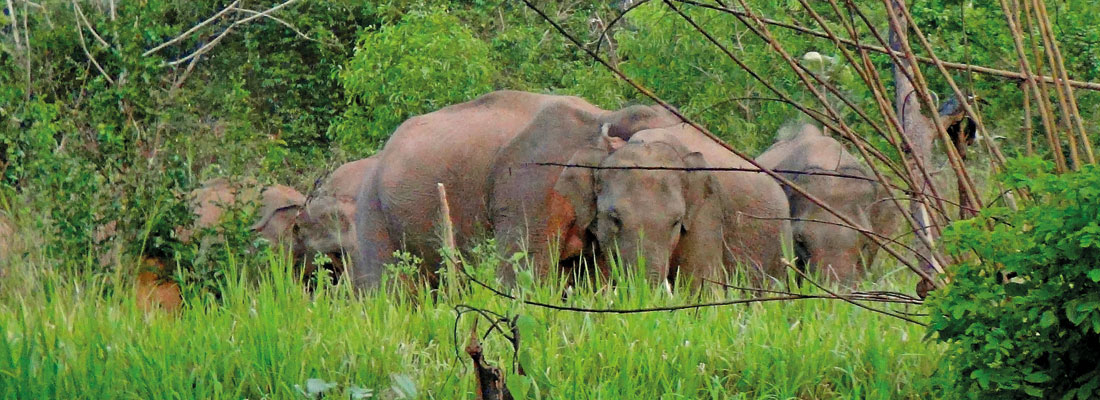The hurried and unplanned elephant drives in North Central province have triggered a series of complications.
Wildlife officials said they were given directions to drive elephants into wildlife parks. The latest drives were in Anuradhapura.
The drives were to direct elephants in forested areas outside of the protected areas into the Wilpattu National park.
The latest complications occurred when wildlife officials were directed to conduct elephant drives to move elephants remaining outside of the Willpattu National Park. The elephants had scattered into many areas instead of heading into the national park, and had trampled cultivation areas.

Elephants in Mahakubukkadawala. Pic by Hiran Priyankara
The ground level state officials were unenthusiastic as directions are enforced by superiors even though they are aware of practical difficulties, sources of the department said.
A senior wildlife official who declined to be named told the Sunday Times that elephant drives should be done with months of planning. A path should be outlined and driving them off would not solve the issue as food, water and habitat needs must be improved.
The official also said that Wilpattu Park does not suit a large number of elephants.
Officials on the frontlines said that elephant drives are ineffective, and cause more damage to farmers when done without proper planning. They said elephant drives are done during a period of drought when there are no cultivations.
Police inspector and Officer in Charge of Oya Maduwa police station, Sumith Chandana Ratnayake who has assisted in elephant drives said they had not given proper results. He said there are more complaints on crop damage.
“Normally elephant drives are not done when cultivations are carried out. The elephants are driven from one place to another and they are confused and angry and are spending time within small patches of forested land between villages,’’ he said.
IP Ratnayake said that as the water level of “Thalawe Ela” remains high making it impossible for elephant herds with calves to cross it to reach the wilderness and move towards Wilpattu.
“There is a shortage of wildlife officers, even if police join, the drives cannot be continued for long distances without a plan. Short distance drives could be done, the drive should be carried out when Thalawe Ela water level drops,’’ he said.
Farmers want firecrackers for themselves instead of elephant drives.
Environmental activists said that they had told the Department of Wildlife and the government multiple times that the elephant drives and re-locations are impractical.
They said that even the Department of Wildlife Conservation (DWC) itself has stopped elephant drives.
However, they claimed that when authorities gave directives for elephant drives, the DWC was defending the government’s instructions despite failures in previous years.
Convener of Biodiversity Conservation and Research Circle, Supun Lahiru Prakash said they personally requested the Minister of Environment to implement the national human elephant conflict mitigation action plan.
“We told them that elephant drives and translocations are ineffective and are not solutions for the human elephant conflict. The president should appoint a presidential task force and implement the national human elephant conflict mitigation action plan,’’ he said.
He said that authorities should look into practicality, scientific information and gather expert views.
Mr Prakash said that there is no scientific way of carrying out elephant drives. Elephants should be conserved within their home ranges even if they live outside protected areas.
The conservationists’ and environmentalists’ requests for a scientific approach is ignored by authorities. Ad-hoc methods are used, he said.
Provincial politicians too, are supporting arbitrary elephant drives.
Hemantha Withanage, executive director of the Centre for Environmental Justice (CEJ) said a letter of demand was sent to the Department of Wildlife Conservation on Wednesday to stop unscientific elephant drives. It was addressed to the Director General.
He said that if elephant drives are unavoidable, it should be systematic and scientific with months of planning.
Mr Withanage said elephant drives without prior studies on the herd composition, movement patterns, and ecological dynamics raises significant concerns.
“The forced movement of elephant herds often results in the abandonment or stranding of vulnerable individuals such as older elephants and calves, leaving stranded individuals vulnerable to starvation, dehydration,” he said.
The villagers say elephants too, need food, water and space.
The Sunday Times called and messaged the Director General of the Department Wildlife Conservation, Chandana Sooriyabandara for his response as environmentalists claim elephant drives are unscientific and done because of government pressure.
They claimed DWC had learned that elephant drives are ineffective.
But, Mr Sooriyabandara said he will remain silent on the matter.
By Kasun Warakapitiya
